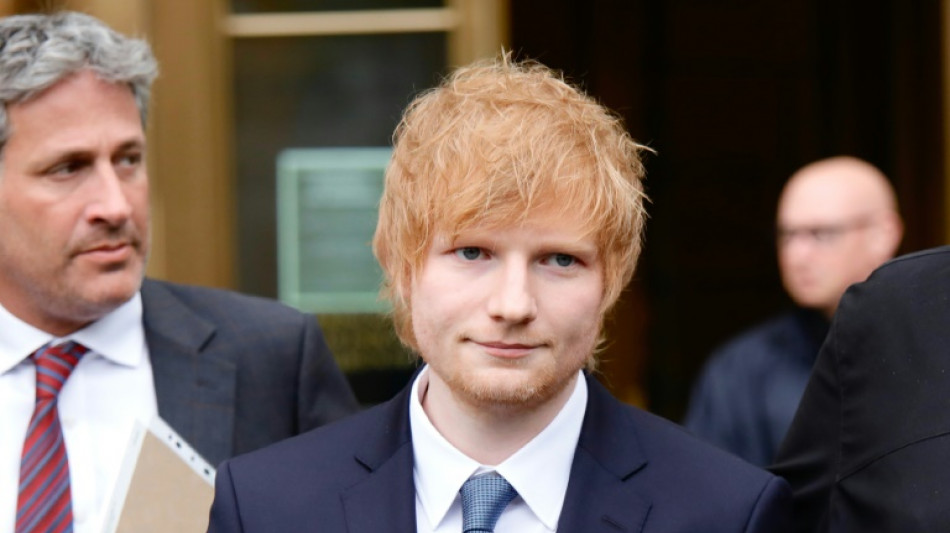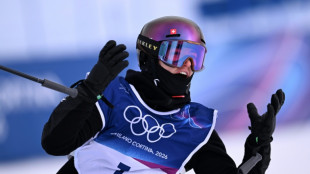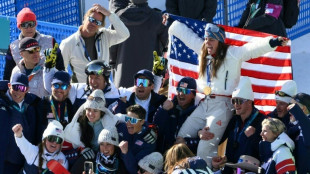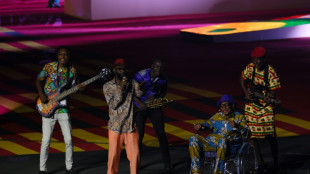
-
 Howe would 'step aside' if right for Newcastle
Howe would 'step aside' if right for Newcastle
-
Sakamoto wants 'no regrets' as gold beckons in Olympic finale

-
 What next for Vonn after painful end of Olympic dream?
What next for Vonn after painful end of Olympic dream?
-
Brain training reduces dementia risk by 25%, study finds

-
 Gremaud ends Gu's hopes of Olympic treble in freeski slopestyle
Gremaud ends Gu's hopes of Olympic treble in freeski slopestyle
-
Shiffrin and Johnson paired in Winter Olympics team combined

-
 UK's Starmer scrambles to limit Epstein fallout as aides quit
UK's Starmer scrambles to limit Epstein fallout as aides quit
-
US skater Malinin 'full of confidence' after first Olympic gold

-
 Sydney police pepper spray protesters during rallies against Israeli president's visit
Sydney police pepper spray protesters during rallies against Israeli president's visit
-
Israel says killed four militants exiting Gaza tunnel

-
 Franzoni sets pace in Olympic team combined
Franzoni sets pace in Olympic team combined
-
Captain's injury agony mars 'emotional' Italy debut at T20 World Cup

-
 Family matters: Thaksin's party down, maybe not out
Family matters: Thaksin's party down, maybe not out
-
African players in Europe: Ouattara fires another winner for Bees

-
 Pressure grows on UK's Starmer over Epstein fallout
Pressure grows on UK's Starmer over Epstein fallout
-
Music world mourns Ghana's Ebo Taylor, founding father of highlife

-
 HK mogul's ex-workers 'broke down in tears' as they watched sentencing
HK mogul's ex-workers 'broke down in tears' as they watched sentencing
-
JD Vance set for Armenia, Azerbaijan trip

-
 Sydney police deploy pepper spray as Israeli president's visit sparks protests
Sydney police deploy pepper spray as Israeli president's visit sparks protests
-
EU warns Meta it must open up WhatsApp to rival AI chatbots

-
 Scotland spoil Italy's T20 World Cup debut with big win
Scotland spoil Italy's T20 World Cup debut with big win
-
Israeli president says 'we will overcome evil' at Bondi Beach

-
 Munsey leads Scotland to 207-4 against Italy at T20 World Cup
Munsey leads Scotland to 207-4 against Italy at T20 World Cup
-
Japan restarts world's biggest nuclear plant again

-
 Bangladesh poll rivals rally on final day of campaign
Bangladesh poll rivals rally on final day of campaign
-
Third impeachment case filed against Philippine VP Duterte

-
 Wallaby winger Nawaqanitawase heads to Japan
Wallaby winger Nawaqanitawase heads to Japan
-
Thailand's Anutin rides wave of nationalism to election victory

-
 Venezuela's Machado says ally kidnapped by armed men after his release
Venezuela's Machado says ally kidnapped by armed men after his release
-
Maye longs for do-over as record Super Bowl bid ends in misery

-
 Seahawks' Walker rushes to Super Bowl MVP honors
Seahawks' Walker rushes to Super Bowl MVP honors
-
Darnold basks in 'special journey' to Super Bowl glory

-
 Japan's Takaichi may struggle to soothe voters and markets
Japan's Takaichi may struggle to soothe voters and markets
-
Seahawks soar to Super Bowl win over Patriots

-
 'Want to go home': Indonesian crew abandoned off Africa demand wages
'Want to go home': Indonesian crew abandoned off Africa demand wages
-
Asian stocks track Wall St rally as Tokyo hits record on Takaichi win

-
 Bad Bunny celebrates Puerto Rico in joyous Super Bowl halftime show
Bad Bunny celebrates Puerto Rico in joyous Super Bowl halftime show
-
Three prominent opposition figures released in Venezuela

-
 Israeli president says 'we shall overcome this evil' at Bondi Beach
Israeli president says 'we shall overcome this evil' at Bondi Beach
-
'Flood' of disinformation ahead of Bangladesh election

-
 Arguments to begin in key US social media addiction trial
Arguments to begin in key US social media addiction trial
-
NFL Alumni Health Partners with Wellgistics Health to Deploy Technology to Improve Health Outcomes for Former NFL Players and Rural Communities

-
 ARIA Cybersecurity and Acronis Debut Windows 10 End of Support Extension of Life Solution
ARIA Cybersecurity and Acronis Debut Windows 10 End of Support Extension of Life Solution
-
White Gold Corp. Appoints Seasoned Mining Executive Donovan Pollitt as Strategic Advisor

-
 Auri Inc ("AURI") New Acquisition Transfer Completed, Revenue Progress Report
Auri Inc ("AURI") New Acquisition Transfer Completed, Revenue Progress Report
-
Ainos Initiates Live AI Nose Deployments within Semiconductor Manufacturing Environments

-
 IRS Bank Levies Can Drain Accounts in Days - Clear Start Tax Explains Why Timing Is Everything
IRS Bank Levies Can Drain Accounts in Days - Clear Start Tax Explains Why Timing Is Everything
-
Jerash Holdings Reports Significantly Improved Financial Results For Fiscal 2026 Third Quarter

-
 Paymetrex Secures First U.S. License Payment
Paymetrex Secures First U.S. License Payment
-
Geophysics Converge Ahead of Colosseum Deeper Drill Program


Sheeran copyright battle could stoke songwriting paranoia
Ed Sheeran is preparing for a blockbuster tour and album release amid regular trips to Manhattan's federal court, where he's defending his songwriting in a closely watched copyright case.
The trial centers on whether the British pop phenom plagiarized Marvin Gaye's 1973 soul classic "Let's Get It On" in his 2014 hit "Thinking Out Loud."
The heirs of Ed Townsend, who co-wrote Gaye's smash, are behind the civil suit, and allege "striking similarities and overt common elements" between the songs.
It's the latest in a series of high-profile music copyright cases that have the industry on edge, leaving some songwriters paranoid about their own creative processes and vulnerability to litigation.
Sheeran, 32, has spent days testifying with guitar in hand, playing demos for the court to prove the 1-3-4-5 chord progression that's primarily in question is a basic building block of pop music that can't be owned.
His legal team argues that Gaye and Townsend were far from the first to record it, citing, for example, a number of Van Morrison songs that use the sequence and that were released prior to "Let's Get It On."
It's a notion echoed by forensic musicologist Joe Bennett.
"The world I want to live in is one where nobody sues anyone for a one- or two-bar melodic or harmonic similarity, because those similarities can so easily occur through coincidence," the professor at Massachusetts' Berklee College of Music told AFP.
"They shouldn't be protectable by copyright."
The case hinges on the actual composition of the songs rather than the recorded versions -- think sheet music, not vibes.
In theory that's a specificity that could help Sheeran's case, but once a music copyright suit reaches the point of jury trial, anything can happen.
Winning demands significant funding and resources, and defendants are beholden to the volatility of opinions from jury members who almost certainly don't have a background in musicology.
Both sides have hired expert witnesses to explain the technical details to jurors, but, of course, their conclusions differ significantly.
"If you play music to a jury, it could go either way," Bennett said.
- 'Chilling effect' -
There have been a handful of landmark music copyright cases in recent years, notably in 2016 when Gaye's family -- who is not part of the New York lawsuit against Sheeran -- successfully sued the artists Robin Thicke and Pharrell Williams over similarities between the song "Blurred Lines" and Gaye's "Got to Give it Up."
The result surprised many in the industry, including legal experts, who considered many of the musical components cited as foundational, and existing largely in the public domain.
Shortly thereafter an appeals court decision confirmed Led Zeppelin's victory over a similar case centered on the classic "Stairway to Heaven" -- a boon for songwriters.
"One reason that this Ed Sheeran case may be really important to the industry is that it's a data point that would show well is the pendulum actually back on the other side, or are we just going back and forth?" said Joseph Fishman, a law professor specialized in intellectual property at Vanderbilt University.
"If it's going back and forth, that could still have a chilling effect on how songwriters write, because you never know -- is my case going to be the one?"
And unintended infringement is a weak defense: in 1976, George Harrison was found liable for "subconsciously" plagiarizing "He's So Fine" by the Chiffons for his first solo hit "My Sweet Lord."
In his memoir Harrison later wrote that he suffered a "paranoia about songwriting that had started to build up in me."
This week Sheeran told the court that fellow songwriters have told him "you have to win this for us" adding with a tone of exasperation that if the Townsend estate prevails, "I'm done."
"I find it really insulting to work my whole life... and have someone diminish it by saying that I stole it," Sheeran said on the stand Monday.
Bennett said many of his students at Berklee -- a prestigious conservatory of contemporary music -- have voiced concern over the Sheeran case, speaking as the next generation of songwriters.
One of them, 21-year-old Mary Jo Swank, told AFP that "I've definitely grown a fear that the idea of being completely original and unique is going to put the emotional and creative process of a songwriter in jeopardy."
"It'd be nice if I'd be allowed to write my take on a 1-3-4-5 progression without having to worry that it's not unique enough."
O.M.Souza--AMWN
